How to increase your company’s potential and achieve success in international procurements?
Is your company ready for new opportunities and eager to participate in tenders organized by international organizations? Tehnopol Science and Business Park invites companies to join the INGO project, aimed at helping small and medium-sized enterprises discover new collaboration opportunities with international non-governmental organizations and intergovernmental organizations (such as the UN, Red Cross, IMF, CERN, Asian Development Bank, etc.). In February, there is an opportunity to take part in a business visit to Geneva as part of the project.
What does the INGO project offer?
- Information on procurement processes and open calls for tenders.
- Guidance and informational events for successful collaboration with international organizations.
- Connecting SMEs with international non-governmental and intergovernmental organizations.
- Support from experts and mentors to facilitate the formation of consortia among SMEs to offer joint solutions in tenders.
- Networking with companies from Estonia, Finland, Latvia, and Sweden.
- Business visits to international organizations (partially covered by the project).
- Sharing best practices, learning from each other, and participating in the cross-border community of SMEs.
To join the project, fill out the application here.
When completing the application to join the INGO project, you can also express your interest in participating in a business visit to Geneva, Switzerland, scheduled for February 5-7, 2024. The business visit includes organization visits, a seminar on UN procurement processes conducted by The Common Procurement Activities Group (CPAG), and one-on-one meetings with UN organizations. All activities during the business visit will be conducted in English.
Approximate schedule for the Geneva visit:
- Day 1
Arrival in Geneva
Visit to a UN organization (TBC)
- Day 2
Seminar on UN procurement and introduction to UN organizations
Presentations from UN organizations and one-on-one meetings with participating companies
The Common Procurement Activities Group (CPAG)
International Labour Organization (ILO)
World Intellectual Property Organization (WIPO)
World Meteorological Organization (WMO)
United Nations Office at Geneva (UNOG)
- Day 3
Visit to the European Organization for Nuclear Research (CERN) (TBC)
Conditions for participating in the business visit:
- Your company is based in Estonia.
- You have a clear motivation to participate in the business visit and an interest in participating in future UN tenders, including specific tenders from UN organizations (ILO; WMO; WIPO; UNOG; CERN, etc.).
- You have a product or service ready for participation in tenders.
- Your company has an English-language website.
- Your company has no tax debt.
The deadline for applying for the business visit is December 18, 2023. Online meetings will be scheduled with all interested companies to clarify motivation and interest in participating in the visit. Selection results will be communicated within three weeks.
Financial support and Interreg Central Baltic program
For the representative of the company participating in the business visit, accommodation (2 nights) and catering during the daily program (lunch on days 2 and 3, evening reception) will be covered within the INGO project. Participants are responsible for covering their travel expenses to the destination and other associated costs.
You can join the INGO project at any time until the project’s completion in September 2026.
For more information and to register your interest, contact katrin.senkevits@tehnopol.ee, or click here to register.
NATO DIANA is investing close to one million euros in startups developing dual-use technologies in Estonia
The headquarters of the NATO DIANA innovation accelerator announced the companies that will be coming to Estonia to develop their solutions. Five accelerators are starting work and covering the whole of the alliance, and more than 1300 companies offering innovative technical solutions have applied to them. The best 44 have been chosen, and nine of them will start to develop their companies in Estonia. The NATO DIANA accelerator in Estonia is led by the Tehnopol Startup Incubator working together with the Sparkup Tartu Science Park and the business accelerator Startup Wise Guys.
All the companies from across the whole of the alliance that have been accepted to the accelerator are developing technologies with great potential that can find applications both in everyday life in the civilian sector and in national defence. The technologies being developed are those in the three general strategic categories of energy and sustainability, communications, and underwater identification and monitoring.
“The NATO DIANA accelerator brings together parts of the defence industry that are of great importance for Estonia and the very lively startup ecosystem that we have here. It makes for a fertile platform from which new ideas can erupt and create the potential for successful new companies in the future”, said Minister of Economic Affairs and Information Technology Tiit Riisalo. “New technologies that can find direct application in both military and civilian contexts will boost and enhance both our economy and our security. That is the clear reason why NATO has decided to invest much more than before in innovation”.
All nine of the teams that have been accepted to the Estonian accelerator will receive a grant of 100,000 euros from NATO DIANA, and the best can get as much as a further 300,000 euros in funding. They will also get access to over 90 testing centres, a programme linking defence and business, and a network of mentors across the alliance. DIANA acts as a bridge between universities, companies and the public sector in order to support the development of innovative technology that can help solve civilian and military problems and lay the path towards a sustainably secure world in the future.
“Innovation is at the heart of national defence because it brings success on the battlefield and gives us an advantage over our enemies. Estonia has been a strong support of NATO, focusing more attention than before on innovation and on the technologies of the future. We are proud that an Estonian company was chosen for the NATO DIANA accelerator, and we await with excitement the dual-use solution becoming a reality that can strengthen our defence”, said Minister of Defence Hanno Pevkur.
The company from Estonia, GaltTec, that has come through the fierce competition to get to the accelerator will address challenges in energy and sustainability, and will concentrate on producing fuel cells and the materials for fuel cells using its patented technology.
“The NATO defence accelerator DIANA represents an important step taken by the alliance against new threats and challenges. The presence of DIANA in Estonia shows how highly our allies value Estonia’s experience within the innovation landscape. It is very good to see the great interest shown by Estonian companies in the programme, and we look forward to seeing technological solutions that will improve our defensive capacity”, said Minister of Foreign Affairs Margus Tsahkna.
One of the three NATO DIANA European accelerators will be in Estonia at the Tehnopol Science and Business Park during this pilot year. The great strength of Estonia’s biggest business incubator is its deep understanding of startups and its long experience of supporting the growth of startups built around technology. Head of the Tehnopol Startup Incubator and the Estonian NATO DIANA accelerator Kadri Tammai said that the technologies of the companies chosen for the Estonian accelerator fit well with Estonia’s strengths in cyber defence, artificial intelligence and autonomous systems, and with the expertise in energy. “We are bringing the defence sector, and the massive market potential that it offers, closer to startup companies. A lot of the technologies that are currently in the development phase will not only make life more convenient, sustainable and efficient for all of us in the future, but will also make a direct contribution to building our defensive capacity”, Tammai noted.
Alongside the Estonian accelerator, DIANA accelerators are being opened this pilot year in Denmark and Italy, with two additional sites in the USA. The companies participating in the NATO DIANA Estonian accelerator are GaltTec, Goldilock, IceWind, Lobster Innovations, AVoptics Limited, REVOBEAM, GIM Robotics, Dronetag, and Anzen Technology Systems.
DIANA will soon be focusing on new challenges that the member countries of NATO identify as priorities in the next couple of years, and that companies will be invited to tackle with innovative technological solutions. The longer-term priority for NATO will include big data analytics, autonomy, biotech and human enhancement, and energy and propulsion. There will be up to ten challenges a year by 2025 that will provide support for hundreds of deep tech companies from across the alliance.
Alongside the accelerator, NATO this year launched the world’s first pan-alliance venture fund, the NATO Innovation Fund (NIF), which will invest one billion euros in European startups developing dual-use deep technology. The fund was set up in 2023 by NATO members, and Estonia invested in it through Smartcap, which is run from the Ministry of Economic Affairs and Communications.
The accelerator in Estonia is led by the Tehnopol Startup Incubator working together with the Sparkup Tartu Science Park and the business accelerator Startup Wise Guys. The funding to start the accelerator in Estonia comes from the Ministry of Economic Affairs and Communications with support from the Ministry of Foreign Affairs, the Ministry of Defence and the city of Tallinn. Estonian contributors to building the pan-Alliance network of testing centres are TalTech, the University of Tartu, Foundation CR14, the National Defence College, the Estonian Academy of Security Sciences, and the Estonian Aviation Academy.
For more see: https://www.diana.nato.int/
AI-powered solutions will transform the landscape of lung disease treatment

Chronic Obstructive Pulmonary Disease (COPD) ranks as a leading cause of morbidity and mortality worldwide, affecting each year approximately 384 million people. In Europe, the annual healthcare costs associated with COPD, covering inpatient, outpatient, and pharmaceutical treatments, exceed 10 billion euros. The disease not only burdens healthcare systems but also impacts the economy, reducing productivity by an estimated 28.5 billion euros and causing 300,000 premature deaths annually.
Addressing this global health challenge is the DIGILUNG project, which aims to create an innovative digital health ecosystem, fostering successful collaborations among various stakeholders, technologies, and strategies. The project focuses on improving patient care and service quality while creating new business opportunities to maximize regional and societal benefits. The project is coordinated and led by the Tehnopol Science and Business Park, supporting innovative integrated solutions and collaboration in healthcare.
DIGILUNG amplifies three AI-based innovation pilot projects to develop and commercialize products, creating a comprehensive solution that integrates them. ATRIDE SMPC (Kinetic Analysis) has developed the wearable LungShirt, which daily records a patient’s respiratory and activity data. These data are sent to the MoveUp AI platform for analysis, interpretation, visualization, and recommendations. Two technological solutions will be brought together by the state-of-the-art API platform of the Estonian company Cognuse.
Vrije Universiteit Brussel (VUB) supports the aforementioned innovation activities with the development of AI algorithms and the analysis of legal and ethical aspects. Clinical testing and validation, crucial in healthcare innovation, are conducted in collaboration with the Research Foundation of the General University Hospital of Valencia (Fundacion Investigacion Hospital General Universitario de Valencia). This ensures that the developed technologies and methods are safe, effective, and ready for widespread implementation in clinical conditions.
DIGILUNG paves the way for a new era in COPD treatment by combining cutting-edge technologies, launching regional ecosystems, supporting a patient-centric approach, and improving the quality of life for those suffering from the disease. This project serves as an example of the future of health technology, where integrated solutions and collaborative efforts help overcome some of our era’s most urgent health problems.
The project is funded by the European Union. The expressed views and opinions belong solely to the author(s) and may not necessarily reflect the views of the European Union or EISMEA. Neither the European Union nor the funding institution can be held responsible for the expressed views.
Your input is needed to support the healthcare innovation in the Baltic Sea region
Tehnopol HealthTech Community is taking part of the project „Economy of Wellbeing of People“. The main focus of this project is to create a collaborative platform to support information exchange and best practices, policy development, and working groups in innovating the healthcare sector.
The first step is to gather input from stakeholders. For this, a short questionnaire has been put together. The questionnaire will take 5-10 minutes and gives us valuable input to support overall developments in healthcare industry.
Please find the questionnaire here and give us your feedback. Thank you in advance!
Siffi’s “Dashboard on Me” sets new standards in employees’ mental wellbeing

Tehnopol, in collaboration with 10 European partners, has officially introduced the Urban Tech project. This initiative is designed to provide funding, mentoring, and training to SMEs and startups based in the EU, with the aim of exploring new market opportunities in the domains of Health Tech, Greentech, and Smart Cities. In the context of this project, the Estonian startup MinuDoc has forged a collaboration with one of the largest hospitals in Estonia, the North Estonia Medical Centre (PERH), to drive innovation in the field of mental health and wellbeing. Both MinuDoc and PERH are membes of the Tehnopol HealthTech Community.
Tarmo Pihl, the CEO of MinuDoc, presented the challenge that PERH was facing, and how his startup has been working to address it.
What is the challenge that you are working on? What kind of change will it bring?
The North Estonia Medical Centre (PERH) identified the need for a more personalized approach towards offering mental wellbeing solutions to their employees. Presently, only about 2-3% of PERH’s entire staff seek therapy and use intervention services, either from PERH’s in-house clinical psychologists or their partner practices. However, the genuine demand for mental health support encompasses around 25% or even more of the employees, extending beyond the confines of traditional therapy. Therefore, the hospital sought a solution that could address the needs of their employees in more holistic and tailored ways, be it coaching, mindfulness programs or awareness materials.
MinuDoc’s international brand, Siffi, offers one-click digital access to therapists and coaches and is currently utilized by approximately 50 mid-sized corporate clients to bolster their employees’ resilience. In total, Siffi delivers mental wellbeing services to 14,000 employees, and this number is steadily growing.
Within the Urban Tech project, Siffi has developed a “Dashboard on Me” feature, allowing every employee to gain insights into their personal psychological profile along a 5-dimensional axis. The framework is based on WHO guidelines for mental wellbeing. During the MVP phase, we refined the concept, created a self-assessment framework with evidence-based questionnaires, introduced gamification, and solicited feedback from PERH through several rounds of meetings. We implemented an MVP version that PERH tested with selected employees to gather initial feedback for the pilot phase. The platform also introduced new services to its platform, such as meditation and mindfulness, audio moments and coaching programs.
The developed MVP solution offers a significant opportunity, aligning well with employers’ expectations for holistic mental wellbeing services. This 360 degree mental wellbeing solution will not only better match employers’ needs, but also enhance Siffi’s position in delivering services to their clients.
Has something similar been done before? If yes, how is your solution different?
Siffi stands out among mental wellbeing companies, providing a comprehensive wellbeing journey that begins with gamified self-assessment and extends to recommending suitable services to users. These services may include awareness-related audiobooks, meditation and mindfulness, coaching packages, or third-party services beyond the Siffi platform. This journey is unique, centred around the needs of every individual employee and takes concern not only in intervention, but also prevention.
How has the process been so far – how far are you with the solution?
The solution is now finalized, and we are embarking on a month-long pilot with our primary partner, the North Estonia Medical Centre during the month of November. Feedback from this pilot has the potential to further enhance our service and align it with the needs of enterprise-level customers, where the engagement models are quite a bit different from small and medium sized organisations.
What have been the biggest obstacles?
As is often the case in startup companies, time has been the most significant obstacle. Efficient time management and achieving goals within planned deadlines have been critical. We allocated most of our resources to launching this new product in October, as these developments are high-priority and eagerly anticipated by many other clients. This meant to keep the focus on getting this particular project done, and reprioritising other developments which are on our roadmap.
What are your plans in Estonia?
The solution we are developing and offering is global, not limited to Estonia. In fact, our international customer base is growing faster than our Estonian customer base. Our plans include continued rapid international growth, which also encompasses Estonia. Here, where only a handful of companies are properly addressing this issue, we believe there is immense potential in the market for employee mental health benefits, with plenty of room for contributions to improving employee health.
***
The key mentor for MinuDoc throughout this process has been Merilin Varsamaa, the Head of Tehnopol’s HealthTech field. Varsamaa highlighted that the partnership between the North Estonia Medical Centre and Siffi has been smooth and empowering. The solution not only offers specialized support to healthcare professionals in Estonia, but also enhances their capacity to utilize intervention methods provided by Siffi. This solution introduces a distinctive aspect to foster mental health among employees in Estonia and equips employers with a range of tools and statistics to establish an environment that nurtures and complements the well-being of their staff. The solution provided by Siffi to PERH attracted enough interest from Tehnopol itself, so that Tehnopol also decided to extend the solution to its own employees starting October this year.
The Urban Tech project has received funding from the European Union’s Horizon 2020 research and innovation programme under grant agreement No 101005301.
Mentors wanted at Tehnopol and Startup Incubator: Contribute to the growth of (startup) companies with your valuable experience
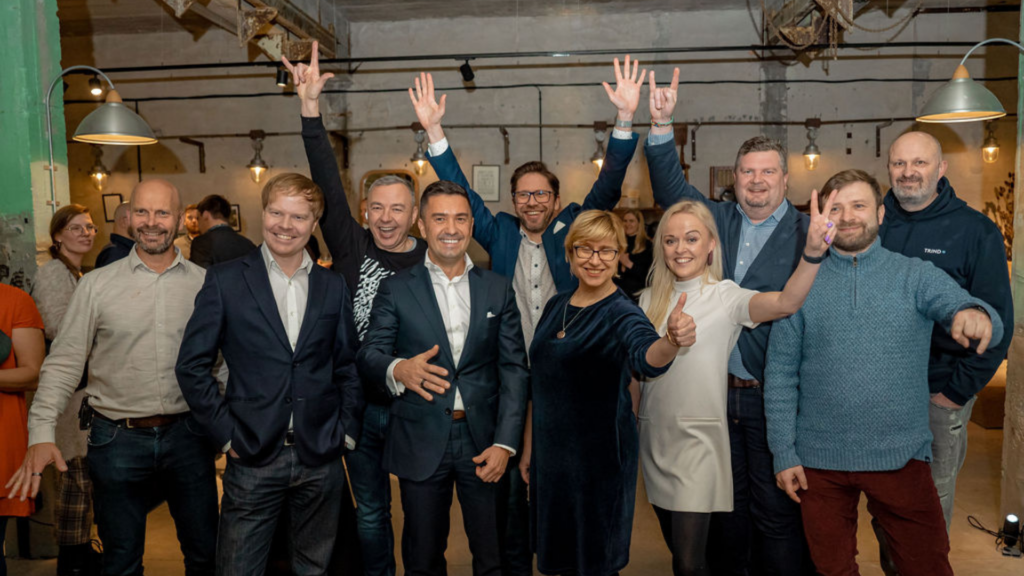
Estonian technology companies create solutions that make our lives and work environment more comfortable, efficient, and sustainable. In order for startups to gain a foothold and growth companies to make rapid development leaps, we invite experts to contribute their experience and knowledge.
If you are excited about technological solutions, want to contribute to the success stories of startups and scale-ups, and are willing to share your experience and knowledge, join Tehnopol and Startup Incubactor as a mentor. To apply, fill in this form! Application deadline is December 13, 2023.
Mentoring will take place with the support of European Union structural funds Interreg Central Baltic, Interreg Baltic Sea Region, I3 Project Grants and Horizon Europe (projects SCALE-ABLE, NBSCALE, BSI_4Women, INGOs, Bridgin4Growth, Urban Tech, GreenTech 2.0, EDIH, Womenture, DigiLung); also within already existing projects (e.g. NATO DIANA, ESA BIC Eesti, Narva Arenguprogramm, Accelerate Estonia, AI arenguprogramm, AIRE-EDIH), as well as within upcoming projects. Read more about our projects here!
Mentoring cooperation contracts will be concluded for one year (January 1, 2024 until December 31, 2024).
If you have any questions, please contact Anne-Liisa Elbrecht (anneliisa.elbrecht@tehnopol.ee) or Maarit Jalakas (maarit.jalakas@tehnopol.ee).
For the first time, the Startup Incubator’s accelerator program features only foreign startups
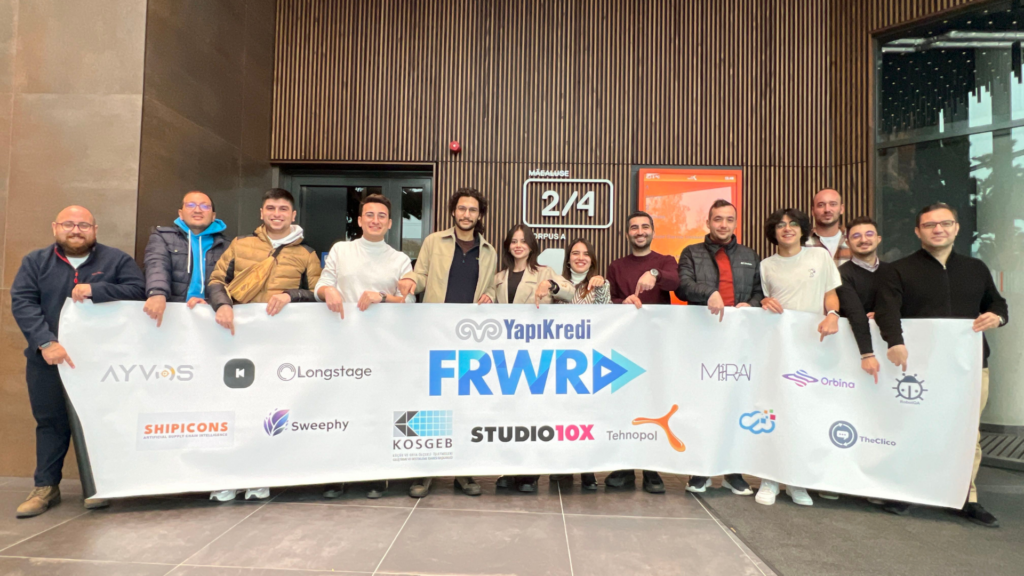
Tehnopol Startup Incubator has launched an acceleration program welcoming Turkish startups. Notably, this marks the first time in the history of the Startup Incubator that the program exclusively features foreign enterprises.
Over the course of two months, the accelerator program will host Turkish startups whose core business concepts are anchored in AI solutions. Tehnopol has successfully conducted a range of AI-focused initiatives, accumulating substantial expertise and knowledge in the field. Within the AI accelerator, Turkish early-stage companies will have access to experienced mentors from Estonia and across Europe. They will also benefit from a wealth of specialized training and expert guidance. Furthermore, the accelerator will facilitate their expansion into international markets and provide invaluable access to global investors.
Turkish startups are participating in the Tehnopol Startup Incubator program in partnership with Studio10x, a company headquartered in Istanbul, which, much like Tehnopol, is dedicated to supporting startups and growth-stage businesses.
Participating startups:
Shipicons is a logistics technologies initiative that analyzes the operational and financial structures of companies that want to export or improve their exports and offers new and alternative supply chain plans.
AYVOS-Holocrow is a unique video analytics and image processing platform allows customers to connect their existing mounted CCTV cameras for analyzing the outputs through a click through and click and use approach.
Symetricx is a Customer Experience Design & Social Media Analysis Platform.
Sweephy is a SaaS platform that enables the creation of value from data using the latest open-source machine learning, and natural language processing models without the need for code knowledge.
MirAI Industrial Data Solutions Software Inc is developing industrial IoT data collection units and monitoring tools to assist SMEs in the production field.
Orbina AI is an artificial intelligence assistant specially developed for individuals and institutions, automating creative content production.
Longstage® is a blockchain and AI powered computer game.
TheClico is an online reputation management software that analyzes customer feedback from different platforms for large-scale brands that receive more than 5,000 feedback monthly from +5 feedback channels, with Natural Language Processing and Machine Learning models and instantly collects it in the control panel interface.
Ali Osman Alpagu – Kuasar Video is an artificial intelligence initiative that analyses social media video for companies and agencies and solves the needs of the target audience.
RobotQA provides a codeless mobile native and web app testing platform and mobile device park, which helps to find bugs before end users.

Creating innovation needs a strategic approach – best practices from the Canadian Innovation Leaders Club
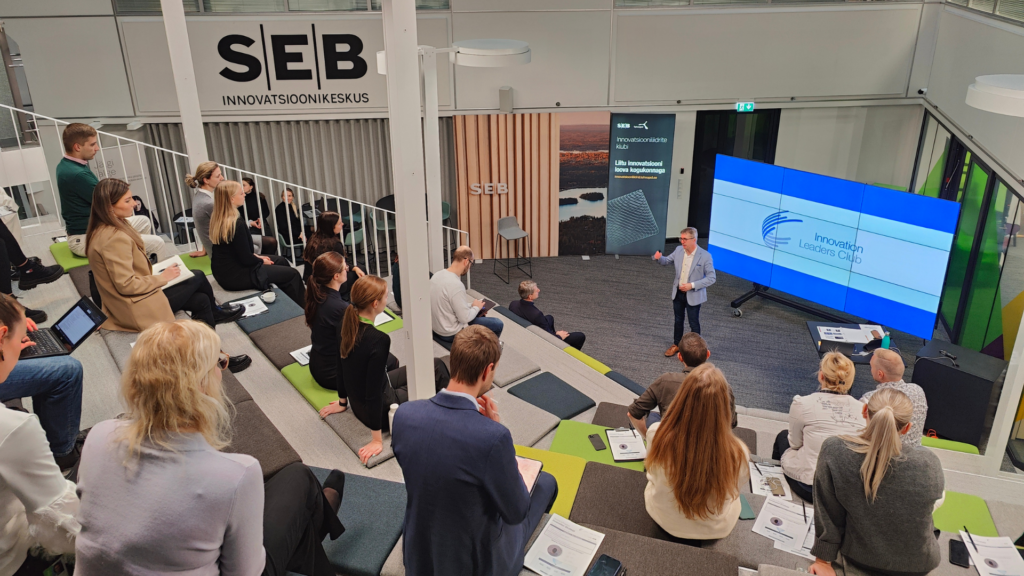
The members of the Innovation Leaders Club gathered for the second event of the IV season at the SEB innovation centre, on the 26th of October. The event was organised in collaboration with the Canadian Innovation Leaders Club.
The Canadian club was represented by Dave Caissy, who shared his extensive experience and valuable insights from working with hundreds of companies, helping them grow through innovation. Two intensive workshops were conducted with the participants, to really put the new knowledge into practice. The afternoon concluded with a panel discussion with Heidi Kakko (UniTartu Ventures), Laura Klemmer (Mobire) and Dave Caissy, where innovation project management and innovation strategies were discussed from practical viewpoints.
Caissy led the introduction by giving an overview the Canadian Innovation Leaders Club, which also extends its reach to New York and Paris. The club closely collaborates with numerous organizations, assisting them in scaling their businesses through innovation.
Constant innovation is a challenge
Organisations recognize the need for innovation, but often they lack the appropriate strategy, which is a vital element for innovation development, Caissy stated. He highlighted that innovation is best pursued proactively, rather than reactively – meaning the ability to take initiative towards innovation, rather than reacting to market volatility or the actions of competitors.
Another frequently misunderstood concept for organisations is the time that innovation takes. The more innovative companies innovate year after year, which for another set of organisations might be a true challenge – but that does not make their innovation processes invalid, Caissy assured. “Develop faster” is not the solution, rather innovators need to initiate processes early on. He emphasized that the solution lies in an innovation system. The main part of the system is the innovation strategy, which Caissy introduced in extent throughout the event. “An innovation strategy is to be clear in what we want to do, focus on, and achieve,” he summarized.
An innovation strategy is a critical component for every innovative organization, as it is simple for innovators to lose focus amidst constant generation of ideas and emerging trends. The strategy helps to keep a level head and focus on the set and agreed upon goals for innovation. A major impediment to innovation is the scattered effort of trying to innovate on too many fronts simultaneously, a point Caissy made from his experience. To address this issue, having an established innovation system within the company is crucial.
Focus on the right elements
Innovation does not necessarily have to be the development of a new product or service, rather it is important to offer new value for the client. “In 2023, innovation is not necessarily something you can sell anymore,” Caissy highlighted. He stressed the importance of having a clear vision of where you want to go, which serves as a guiding light throughout the innovation processes. Caissy asked the audience to guess how many novel innovation ideas Apple, one of the most innovative companies, receives on a daily basis. ”They don’t even know, since they don’t care,” Caissy answered humorously, “this is how strong their vision and innovation strategy is.” He was also clear that an innovator needs to know how to say “no” – if it cannot be done, then the innovation strategy is not clear.
Organizations often worry that their lengthy innovation processes might not be perceived as innovative once they finish. Caissy encouraged to focus on the external, not the internal perspective – while internally it might seem as if the innovation process is taking too long, then externally it goes unnoticed as the end client will not sense this timeline – they only sense the value offering.
The processes for innovation need to start early on. Caissy brought an example of one company, which noticed its main product sales declining and rang the figurative fire alarm for the fast-paced need to innovate – only to be already too late. He advised once more that innovation needs to be proactive, and that it needs to start when everything is going well, not when “the fire is burning”.
In order to achieve significant innovation, it is imperative to have a dedicated team. Caissy stated that the core team involved in the innovation processes should be smaller rather than larger, as a larger team often leads to fragmented results. A smaller dedicated team has the ability to truly focus on the vision for innovation and take action accordingly, he emphasized. “The vision needs to be ambitious. If your objective is not motivating people – then you have the wrong one.” He advised having a 3-year innovation program instead of an annual one, as it is a more attractive timeframe for innovation creation for all parties involved.
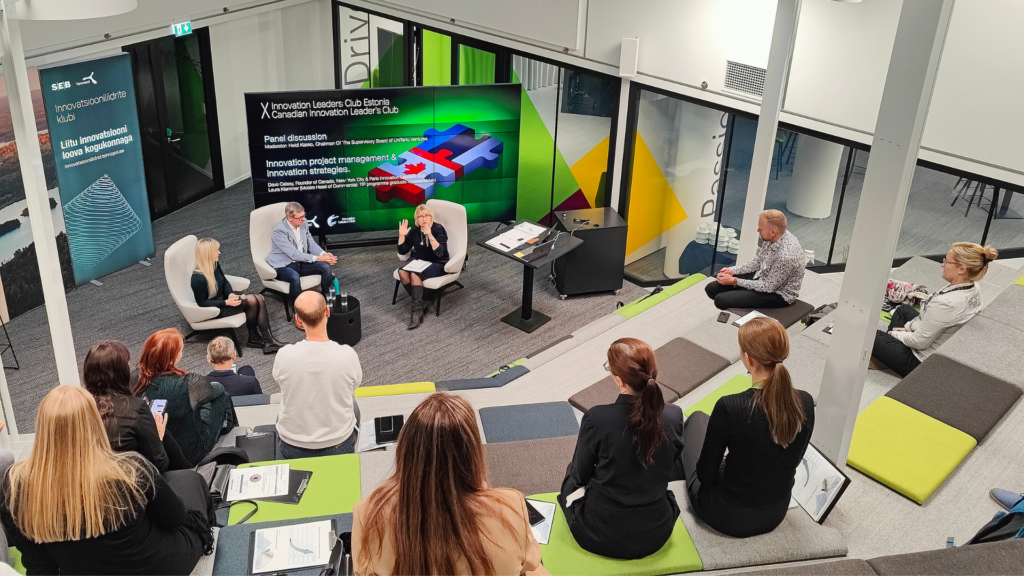
Innovation management needs to be ambitious
Before proceeding to the second workshop of the day, the specialists engaged in a panel discussion. Laura Klemmer introduced the innovation practices and experiences from Mobire, a company operating in the field of full-service car rentals. Their current innovation program is working on entering the B2C market, which brings along a whole new customer segment. She shared that Mobire has defined strategic areas they want to innovate in, including digitalization, expanding their customer value offering, and acquiring new customer segments – all of their innovation efforts are directed toward these areas.
The panelists elaborated on who should be the leader of innovation within a company. Caissy suggested that appointing a “director of innovation” is often a mistake, as innovation management has different layers. In the most innovative organisations, you do not usually see a specific innovation leader, you see different layers of innovation managers. Klemmer confirmed this by sharing that Mobire had established an “innovation board,” consisting of three people who evaluate the company’s innovation processes.
The panelists further discussed on how proactive – or crazy – a company can actually be about innovation. Caissy suggested that an organization likely will not reach the lengths of Mars, and not even the Moon, but the important thing is to keep aiming that high. As innovation can be incremental or disruptive, how can companies take a bigger leap by creating disruptive innovation? Caissy shared his insight that, in most cases, disruptive innovation is not planned and rather just happens – by taking small steps consistently, it is likely that a disruptive innovation reveals itself within the process. Klemmer added that in order to be an innovator, one does not need to be an inventor, rather it is necessary to look what is happening around and adjust accordingly.
The innovative wound dressing created in Estonia shows good results in treating diabetic foot ulcers
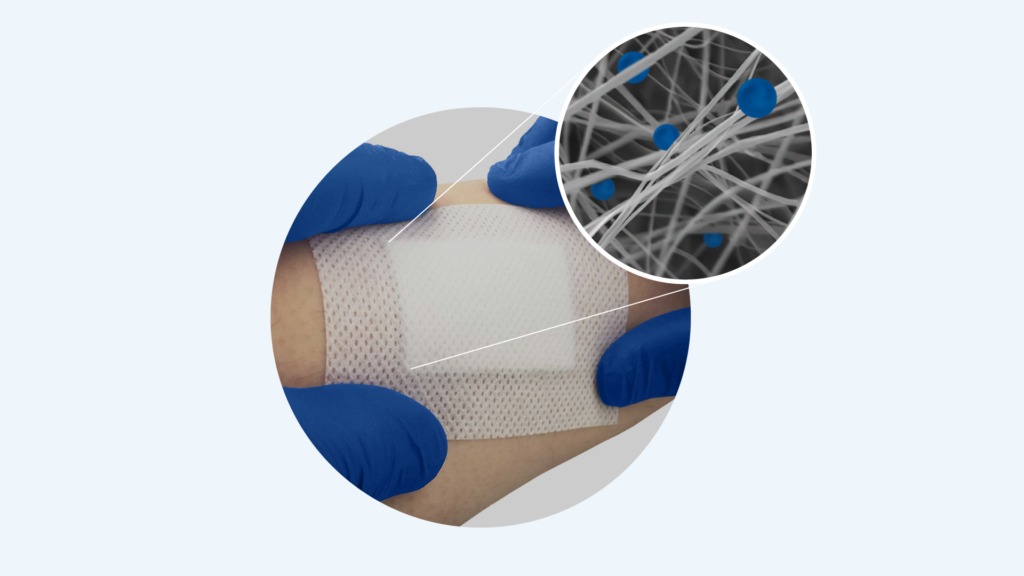
“Diabetic foot ulcers are a very serious problem around the world”, notes co-founder and CEO of Nanordica Medical, Olesja Bondarenko. This is a major reason why Nanordica Medical and North Estonia Medical Centre, members of the Tehnopol Health Tech Community, carried out research focusing on finding a more efficient treatment for foot ulcers for patients with diabetes.
“Among patients with diabetic foot ulcers, 67% are not cured within 12 weeks by the treatment currently offered, and that figure does not get any better later on. Half of those patients die within five years. That is a truly shocking statistic”, said Dr Bondarenko.
North Estonian Medical Centre tested Nanordica’s solution that would help to treat patients with diabetic foot ulcers faster, more effectively and more safely. In practical terms, this meant that Nanordica developed an innovative wound dressing for ulcers that was compared in clinical trial with the standard treatment, dressing based on ionic silver, used at the North Estonia Medical Centre.
The patients had their dressings changed during three visits, with half of them receiving the dressing from Nanordica Medical, and half using a competitor’s. During the subsequent monitoring, it was observed how the wounds healed and what side effects the different dressings caused.
There were 30 diabetic patients with foot ulcers participating in the research. “It was important for us to alleviate the suffering of patients with chronic wounds who were treated previously with various standard of care methods but without success”, said Dr Bondarenko. She gave the example of patients who had been suffering for two years already and who had tried various treatments but without any notable results.
Clinical research showed that using the Nanordica dressing helped the wound heal faster than with the dressings of competitors. “The effect was visible in most cases after already the first dressing application, as the wound shrank noticeably in size”, observed medical personnel performing the trial. These indications are very promising and an official report produced by an independent company on the results of the clinical trial should be ready in November.
There is a lot of interest in the wound dressings
Hospitals have already shown interest in using the Nanordica dressings, though the dressings have to be certified with CE marking first. A quality management system has been set up for the application for the CE mark and some of the tests have been done, though some are still ahead. The plan is to apply for the CE mark next year.
Until the CE mark is awarded, all clinical research and even each individual use of the dressing by a patient needs a separate application to the ethics committee and the permission of the Health Board. Hospitals are interested in the wound dressings and patients are contacting the company directly, so Nanordica is considering going ahead with additional clinical studies. These would aim to establish, how effective the Nanordica wound dressing is for different types of wounds. Negotiations with various hospitals have already started to this end to find the best form of cooperation for involving patients most effectively and carrying out the studies.
Thus, the Nanordica wound dressing will be most likely available to patients in the next year. “If hospitals and clinics are interested in working together with us on our research, they are always welcome to let us know”, said Dr Bondarenko.
The clinical trial was supported by the Tehnopol led Connected Health Cluster (now called Tehnopol HealthTech Community). The trial was co-funded from European Structural Fund resources.
Estonia is seeking new business models that need regulatory change
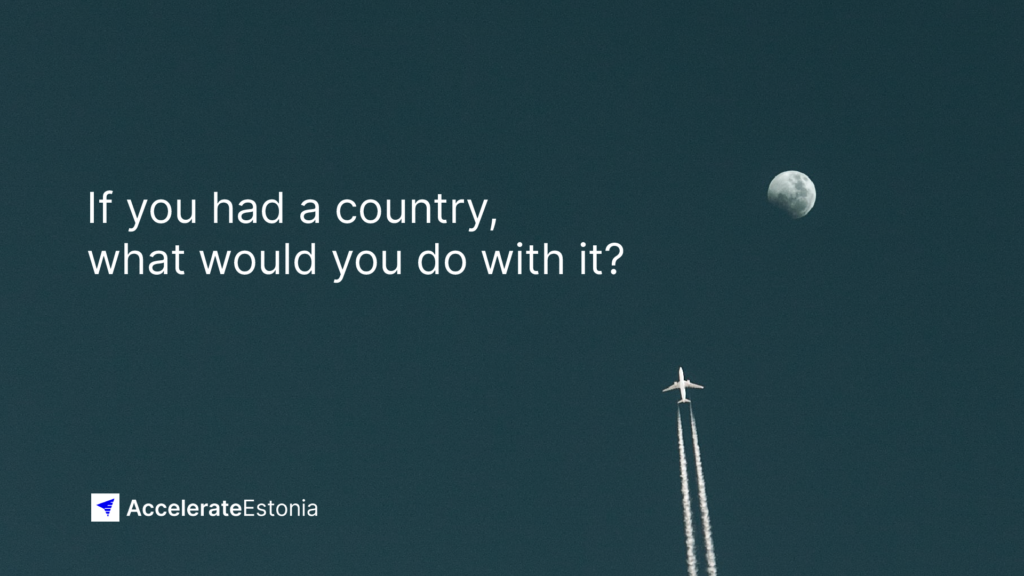
Accelerate Estonia is looking for novel solutions that are blocked by systemic barriers and need public sector intervention. We are in search of entrepreneurs looking to turn challenges into new market opportunities and as a result develop significant economic benefits for Estonia.
Accelerate Estonia is a governmental innovation lab shaping public policy to enable impactful businesses. The program creates new market opportunities from Estonia to the world by helping businesses overcome regulatory obstacles. With the mandate from one of the most agile government’s in the world the program is set to enable ideas which are at the forefront of global innovation.
Apply to Accelerate Estonia to remove regulatory barriers from your path to success and let’s create new opportunities together which benefit the entrepreneur, the surrounding industry, Estonia and the world.
Find out more: accelerateestonia.ee/apply
An Estonian startup firm is causing a revolution in its field, says the International Basketball Federation (FIBA)
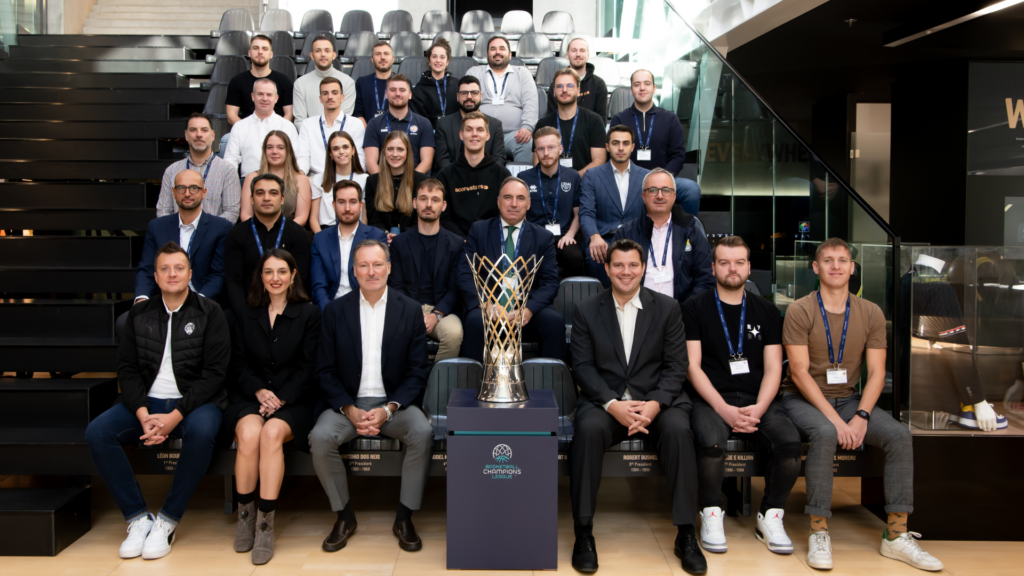
Scorestars, formerly known as Cryplect, started working recently with the International Basketball Federation (FIBA) and is offering fans the chance to play the brand new BCL (Basketball Champions League) fantasy league for the new season. Scorestars, which emerged from the Tehnopol Startup Incubator growth programme, attended a meeting of FIBA in Switzerland in early October to share experiences and gain new contacts.
FIBA said that Scorestars is causing a revolution in the way that fans can relate to their favourite clubs. FIBA has its head office, known as the House of Basketball, in the Swiss village of Mies, and Scorestars recently gave a presentation there to international basketball clubs and other attendees on its work and opportunities for partnerships.
There were 32 different clubs represented at the meeting, all of which play in the FIBA Basketball Champions League and can provide an entry point to local markets. Clubs from Italy, Belgium, France, Portugal and Greece were there among others, and they heard about the Scorestars value proposal for the first time, and indicated that the people running basketball in those countries could well be very interested.
“The meetings went well. We managed to talk about our success in the markets where we are already present and encourage the heads of some of the top basketball clubs in Europe to join us on our journey”, said co-founder and marketing director of Scorestars Samuel Vard. He added that sporting organisations can be rather conservative and are quite a closed society, but that the Scorestars team were welcomed very warmly and professionally.
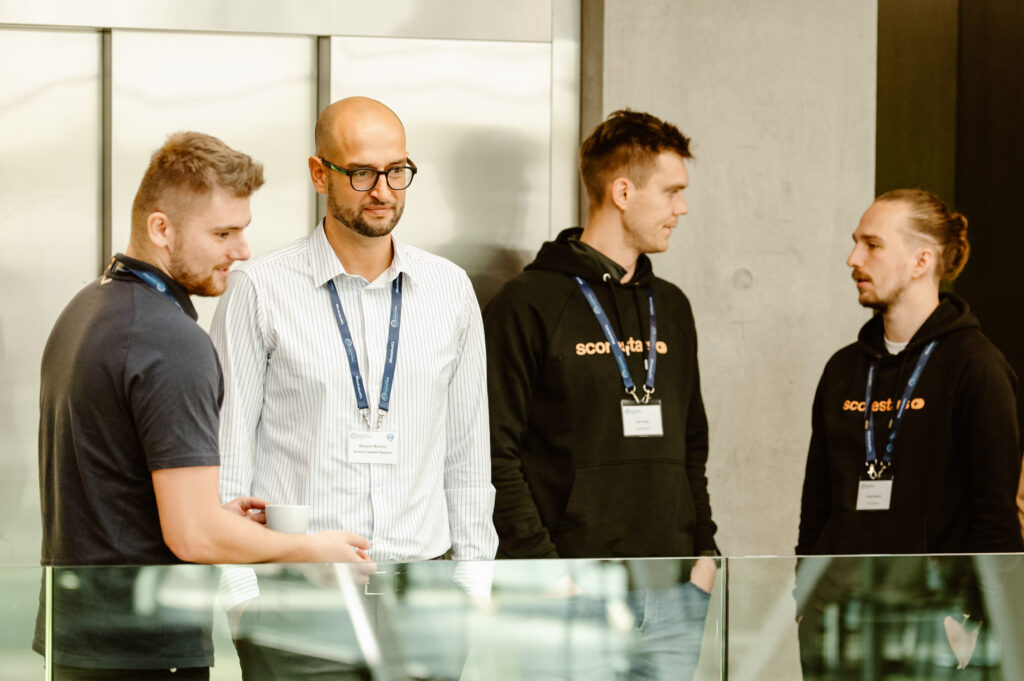
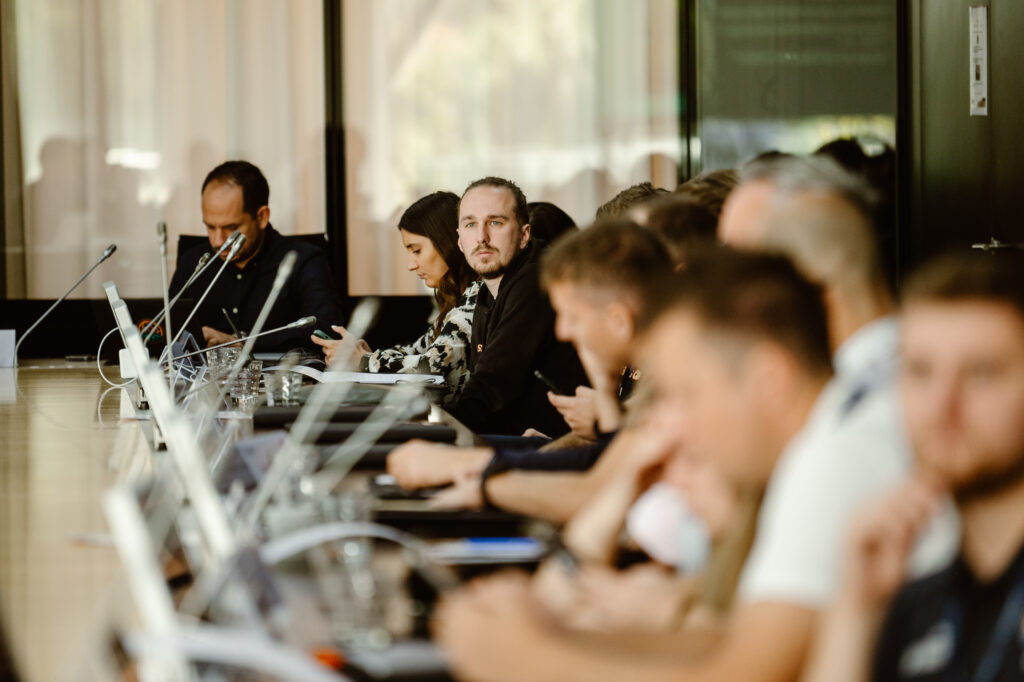
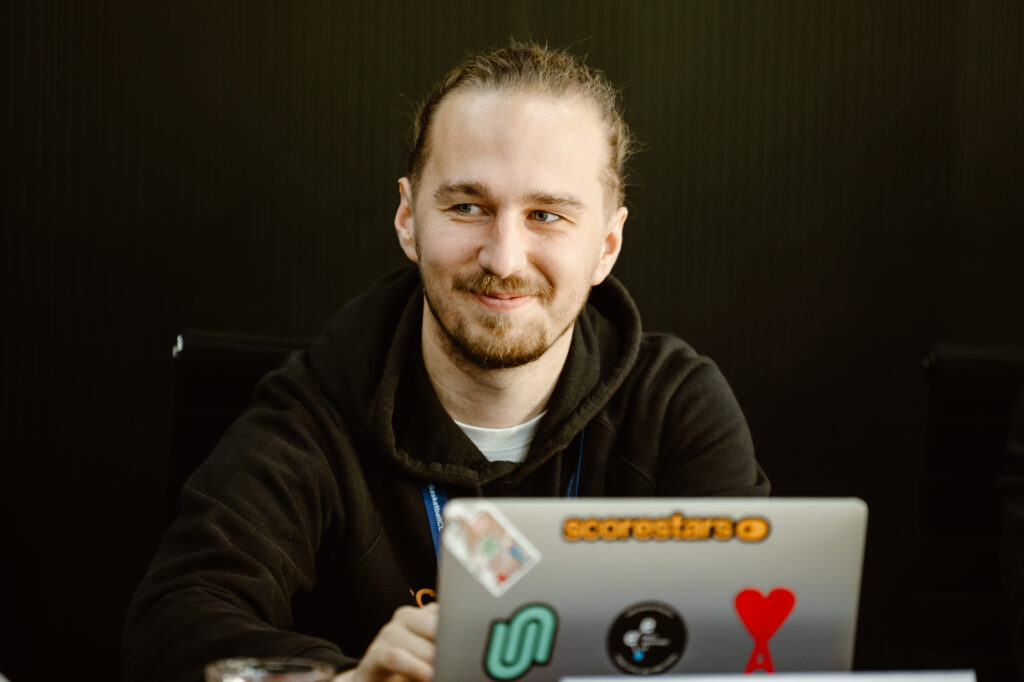
There are two other companies in operation that are in some way or other similar to Scorestars, and both of them were founded in France. Samuel Vard explained though that there were several differences between the products offered by Scorestars and those of their competitors. “We let basketball fans collect both picture cards and video cards of their favourite players, and the digital cards can be used to play the fantasy game. Our strategy is also very favourable for the partners that we cooperate with because they do not have to pay anything to work with us. We are working together to bring European basketball fans to a single digital platform that Scorestars already operates in more than 10 markets”, he said.
The company has had to overcome several obstacles to enter new markets, such as translating the platform from English into Lithuanian, Turkish and Hebrew. As each national league is different, the platform always has to be adapted to meet the expectations of the fans in each country. “When we started working on Scorestars some years ago, we understood immediately that we had to create a technology system with the most dynamic architecture possible, meaning we had to be ready to provide different game logic and fan experiences in different markets and for different types of fans”, explained Mr Vard.
Scorestars is by now an official partner to four large sporting organisations that between them manage over 70 basketball clubs. It plans to expand across Europe in the coming years to cover the majority of the elite basketball landscape in Europe. The main partners that Scorestars has worked with to enter new markets have been the local basketball leagues, but in the coming years it plans to work more with basketball clubs so that it can offer their fans a more personalised user experience.
Scorestars went to Switzerland as part of the Northbound Scaleups (NBSCALE) project. NBSCALE is a joint project run by Tehnopol, the Turku Science Park in Finland and Movexum in Sweden to help companies expand into new markets. NBSCALE project is funded by the EU Central Baltic Program.
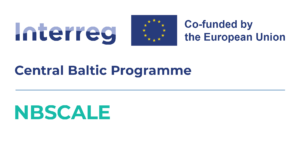
Womenture X Merlin Seeman: Take the leap, and launch your business!
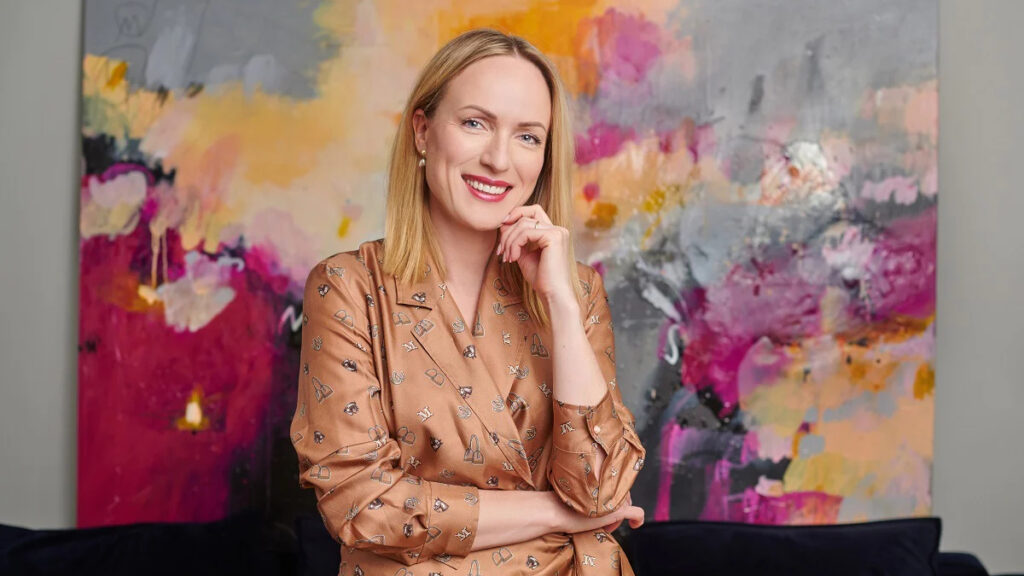
Tehnopol, in collaboration with the Womenture program, has a mission to inspire women on their entrepreneurial journey. Within this program, we get to know remarkable and inspiring female entrepreneurs and explore what has supported them on their entrepreneurial path and what advice they would give to others.
This time, our questions were answered by Merlin Seeman, the founder of Symmetrista, as well as a lawyer and managing partner at the Hedman law firm.
What inspired you to start your own business?
What inspired me to start Symmetrista was my own 15-year personal struggle to find bras that properly fit my uneven breasts. I realised there was an unmet need for comfortable, one-piece bras designed specifically for women with breast asymmetry. The idea of creating a solution for not just myself but millions of women dealing with this issue inspired me to turn this concept into a reality.
Seeing the confidence, the Symmetrista bra provides these women is incredibly rewarding. Many share that for the first time ever, they feel their breasts look even and proportional, and it’s all thanks to the bra. This simple garment provides a life-changing boost of feminine confidence. Many had lost touch with their sense of style and femininity, flattening their form with sports bras and the like. Now, with the Symmetrista Signature, they enthusiastically share that they’ve started wearing open-neck and slim-to-fit clothing.
The difference Symmetrista makes in these women’s lives is profound. To help women reclaim their feminine spirit and self-esteem, to make them feel gorgeous and confident – that is what inspires me and makes every challenge in building this business so worthwhile.
Please share some valuable lessons or experiences from your entrepreneurial journey that you think would be helpful to other women looking to start their own businesses.
My entrepreneurial journey with Symmetrista has taught me that patience, consistency, and hard work are key. Building awareness for a niche product doesn’t happen overnight. We’ve learned it’s about more than just selling a bra – it’s about creating a supportive sisterhood and spreading understanding of an issue many women don’t realise is so common.
Entrepreneurship is never easy. But what has helped me pull me through is dedicating myself fully to the cause and persevering even when progress seems slow. I endeavour to keep sight of the big picture vision, refine the product, and stay relentless.
Thankfully, the traction and community we’ve built and are still building make every difficult day worthwhile. Though the road is long, you will find motivation when you experience those first signs of progress. Stay fixed on your vision and keep putting one foot in front of the other. Soon, you’ll find you’ve walked further than you ever imagined.
Please give 3 recommendations for women who want to start their entrepreneurial career.
Find a mentor(s): Having someone who has been there before to provide guidance and support can be invaluable. In the absence of a direct one-on-one mentor, surround yourself with people who have been in those same shoes. Here’s my tip – join top networking groups or reach out to successful entrepreneurs and ask them to mentor you. Remember to reach out to them in the right way.
Make that move: Understanding the critical aspects of starting a business, from finances to operations to growth strategies, is crucial. Being prepared will set you up for success, but don’t get bogged down striving for perfection. If you have a solid idea, take the leap, and launch your business. If you are waiting to have it all figured out, you might never get to actually start the business or take it to the next level. And even when you find the courage to make your move, obstacles will arise no matter how much you plan. So, what you have to do is just take that step. You don’t have to feel 100% ready. However, it’s also crucial to consult experts as you go ahead with your operations. You’ll feel more at ease knowing that your actions have been checked by them.
Believe in yourself: Self-doubt can be a great barrier for founders and prospective founders. According to a Zapier report, 61% of Americans have had an idea for starting a business, but 92% of those people didn’t follow through with their idea. That is why you need to have confidence in your vision and abilities. Be aware of the challenges you’ll face, but don’t let fear hold you back from taking risks. So, tune out the doubts and take the entrepreneurial leap. After taking that leap, focus on growing and bettering yourself each step of the journey.
Please recommend one book or podcast that has supported you in your career journey.
I find inspiration from a variety of podcasts, so it’s hard to choose just one that has supported my journey. A few that have been incredibly valuable are Diary of a CEO, WorkLife, and The Pursuit of Scrappiness.
Diary of a CEO stands out for its raw, transparent look into the world of business leadership. Steven Bartlett has a gift for drawing out candid stories from founders and CEOs. Adam Grant always provides research-backed insights on productivity, culture, and fulfilment in WorkLife. And The Pursuit of Scrappiness keeps me grounded with its practical tips on bootstrapping and entrepreneurship.
I enjoy listening to these podcasts while engaging in sports. But when not listening to podcasts, you’d find me listening to some relaxing tunes. Ultimately, having diverse sources of motivation and learning to integrate them into a well-balanced life is what matters. At the end of the day, it’s about finding what fuels your mind, body, and spirit.
Womenture connects and empowers European female entrepreneurs through training, events, and mentor meetings. Womenture is your opportunity to become part of an encouraging female founder community that will support you in turning your business idea into reality.
The application process is open until November 30th, 2023.
Check the details for the application at https://womenture.eu/p/tehnopol

















